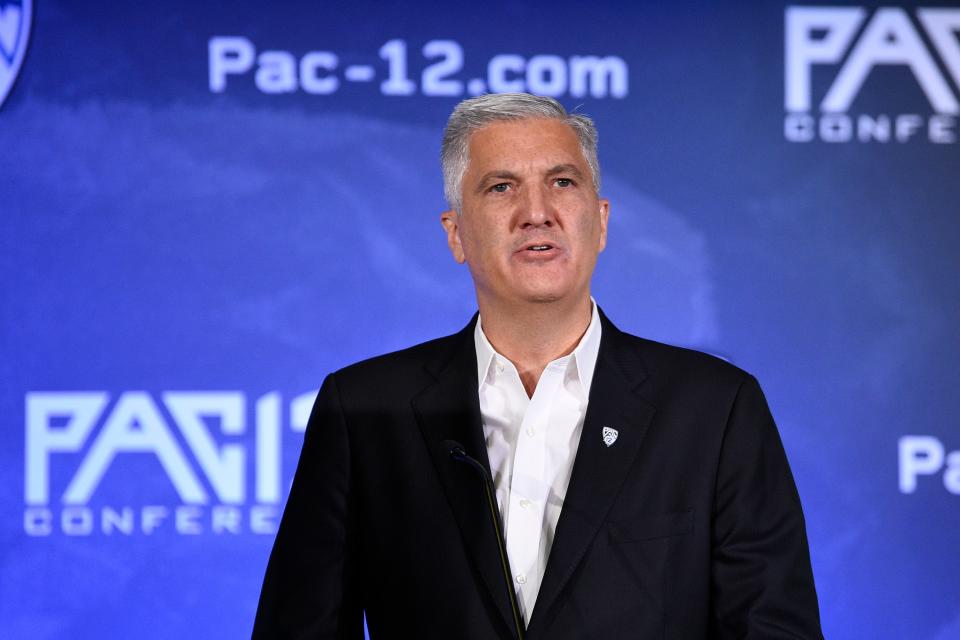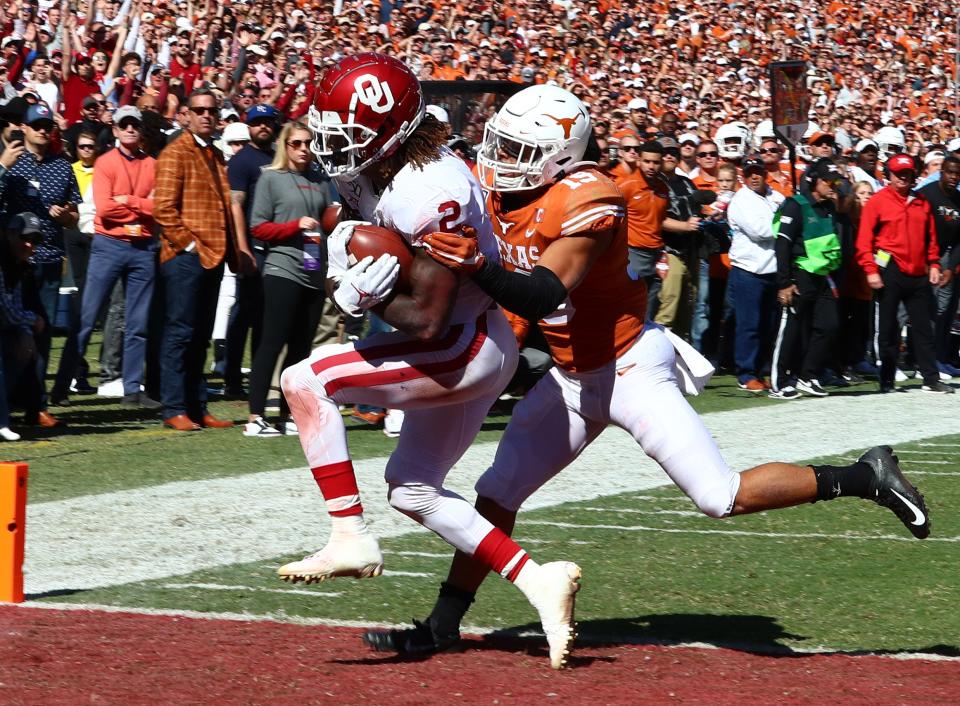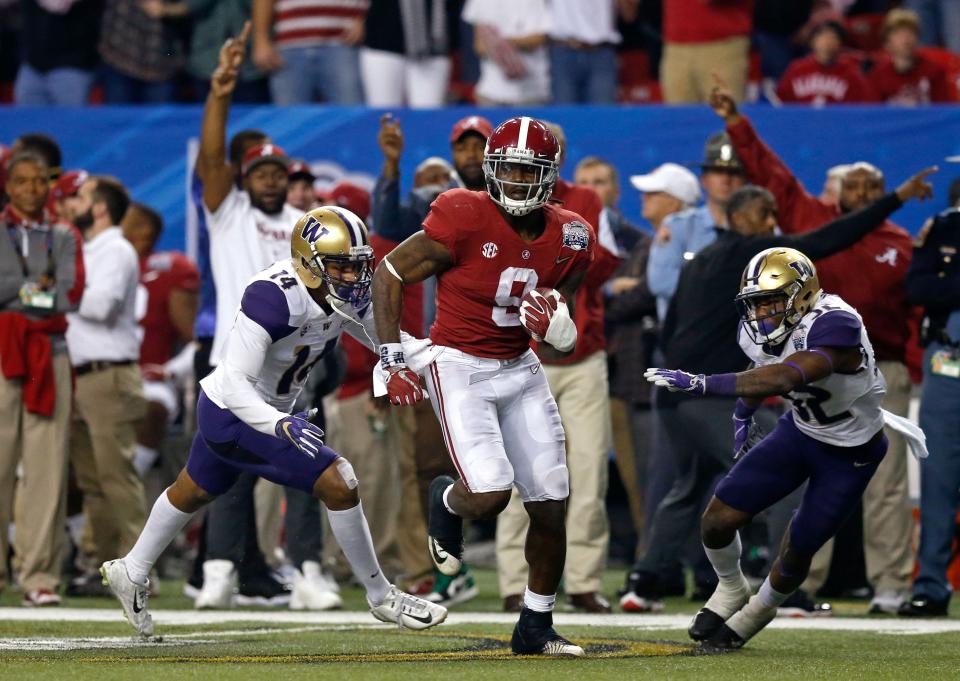Pac-12 commissioner Kliavkoff: 'We have to be more competitive' in football, men's basketball

George Kliavkoff has been commissioner of the Pac-12 Conference since last July, when he succeeded Larry Scott. Upon taking over, Kliavkoff outlined his vision for the conference. His guiding principles have not changed, but the college athletics landscape has significantly, with perhaps the biggest upheaval coming with the enacting of name, image, likeness rules that allow athletes to receive financial compensation through avenues including promotions and marketing opportunities.
This week, representatives from four conferences — the Big Ten, Big 12, Pac-12 and Mountain West — gathered in Scottsdale for spring meetings. After attending the discussions, Kliavkoff departed for Washington D.C. to speak with U.S. senators alongside SEC commissioner Greg Sankey about where things stand with NIL, according to multiple reports.
In an exclusive phone interview with the Arizona Republic, Kliavkoff, who came to the Pac-12 after serving as president of entertainment and sports for MGM Resorts International, touched on the new challenges facing college sports, his vision leading the Pac-12 and where the conference stands within the Power Five. The questions and answers have been edited for length and clarity.
Q: The Big Ten, Big 12, Pac-12 and Mountain West are all in different positions in terms of NIL, the transfer portal, conference re-alignment. Where does the Pac-12 stand on these issues? As commissioner, where is college football going in the near future?
A: "Conference re-alignment is its own beast and every single conference has to determine whether or not to try and add schools or to protect their own schools. We went through our process at the Pac-12. Our 12 presidents and chancellors agree that they were very happy at 12 and that we had no desire to expand, despite the fact that there were many, many schools that asked to join the Pac-12 after the news of Texas and Oklahoma leaked back in July.

"With respect to the other issues you brought up, I think we are very aligned with the Big 12 and the Big Ten and the Mountain West, as well as with all of the other BCS conferences. The commissioners agree that NIL is a good thing. Student-athletes should be allowed to be paid for the use of their name, image and likeness. I think collectively, we all believe that there need to be some guardrails to rules that we believe should be in place and should be enforced, or that NIL should not be used for inducement to go to a particular school and should not be used as pay-for-play.
"Every single commissioner believes that and I think we're all frustrated that those rules, despite the fact that they exist in the NCAA bylaws, have not been enforced. I think we're all hopeful that the NCAA will start enforcing those rules sooner rather than later because we have a mess right now in NIL.
'Adapt or die': College football coaches wrestle with changing NCAA landscape
"With respect to the transfer portal, I think we're all supportive of the concept of student-athletes being able to transfer to a different school if they're not having a good experience at their school and that they should not be penalized and have to sit out after the transfer. I think we also all believe that what we have today, because there's no calendar around transfer, is basically 365 day-a-year unrestricted free agency and that is causing havoc because you have kids transferring at all times of the year. Technically a kid could transfer the day before a game and we have seen in some of our programs kids transferring on the first day of classes.
"I think we're all in agreement that we're supportive of the transfer portal, but we believe that there should be well-regulated calendars and open periods for transfer and closed periods for transfer, just like there exists in every other sport that allows transfers."
Where do you think the Pac-12 stands in terms of conference development within the Power Five and the college athletic structure?
"I feel very confident in our position as a conference. We are in a great place because our media rights deal is coming up for renegotiation a year after the Big Ten and we believe the Big Ten will help to properly set the valuations for college sports. I think in the landscape of sports rights, college sports is undervalued. I think we'll see that proved with the Big Ten's deal and our intention is to kind of piggyback on that deal and continue to drive forward our media rights opportunity.
"I couldn't be happier about where we sit among the Power Five and among the broader collegiate athletic landscape. Love our universities, love the product we're putting on the field. I've been very public about the fact that I think we have to be more competitive in football and men's basketball and what I like is I see our schools making an investment in those sports and I'm sure it's gonna pay dividends over time."
3. What's your perspective on College Football Playoff expansion and whether you think that might be the piece that helps get the Pac-12 back in the playoff?
"Two separate things there. With respect to expanding the College Football Playoffs, we're very much in favor of expansion. We actually would have voted to expand immediately within the current term of the agreement because we knew what all of the rights fees and times of the games and all the other parameters would have been. We were asked to also vote to extend the contract and expand, but without understanding all of the various components including the revenue split, I could not vote for that. I've never in my life signed a contract without knowing the price of the thing I buy.

"We were kind of forced to vote no on extending and expanding the playoffs, but we want the playoffs to expand as quickly as possible. What we're doing as a conference is as long as the playoffs remain at four, ... I believe every one of our schools will make every decision that they get to make to optimize for getting one or more of those four invitations every year. And then when the playoffs expand and I believe they will expand, we'll revisit those decisions and re-optimize to get as many of whatever the number of playoff spots that are available as invitations."
4. What's your confidence in the competition level of Pac-12 athletics and how it compares to other Power Five conferences?
"I think we're in a great competitive position. I like where we are because I see the investments that are being made and because I know that our most recent years' performances have been hit in a way by COVID that no other conference was hit. We canceled games and we didn't play a full football season and we had very, very restrictive states that limited what we were able to do in sports in a way that no other conference, specifically no other Power Five conference, had to deal with.
"So this year's performance was not where I wanted it to be. But I think it's kind of part of the COVID hangover, and I think we'll be coming out of that in the coming years and I love the progress that we're making, particularly the investments that are being made in those sports. And all of that is being done while still continuing to invest in all of our other sports that make us the Conference of Champions. We have won four titles this year. We've won overall 541 titles and that puts us more than 200 titles above any other conference in history. So I like where we are."
5. What are your top priorities for the Pac-12 to continue its growth?
"I stated four priorities when I was announced last May, almost a year ago. ... No. 1: extend our leadership position that we have gained over the last decades in how we take care of our student-athletes. We do more for our student-athletes, I believe, than any other conference. We were the first to include student-athletes in our governance structure. We are a more diverse, historically, conference than any other and I love how we take care of our student-athletes. I want to extend that leadership position.
"Second is to make the investments necessary and make the decisions necessary to optimize for CFP invitations and men's basketball tournament invitations. Third is to continue to invest in all of our other sports to extend our leadership as the Conference of Champions. Fourth is to make all of the decisions we can to best line ourselves up for media rights renegotiation. Our media rights come up for renegotiation in a little bit more than two years."
This article originally appeared on Arizona Republic: Pac-12 commissioner eyes football playoff expansion, more NIL structure

